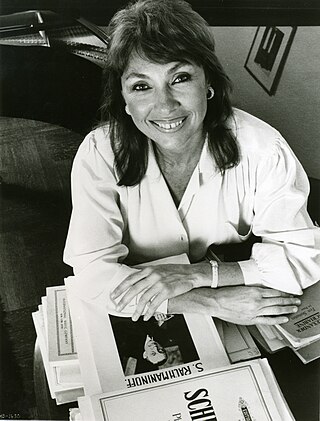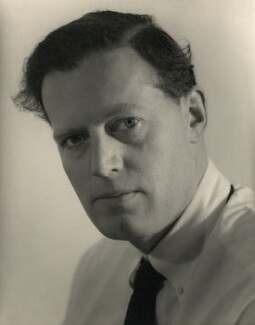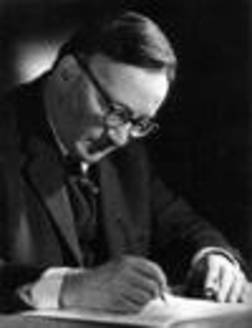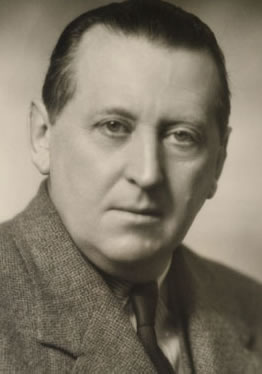Related Research Articles
William Jennings Bryan "Ben" Weber was an American composer.

Alun Hoddinott CBE was a Welsh composer of classical music, one of the first to receive international recognition.

Alexander Nikolayevich Tcherepnin was a Russian-born composer and pianist.

Hilding Constantin Rosenberg was a Swedish composer and conductor. He is commonly regarded as the first Swedish modernist composer, and one of the most influential figures in 20th-century classical music in Sweden.

Ruth Laredo was an American classical pianist.
E minor is a minor scale based on E, consisting of the pitches E, F♯, G, A, B, C, and D. Its key signature has one sharp. Its relative major is G major and its parallel major is E major.

Richard Anthony Sayer Arnell was an English composer of classical music. Arnell composed in all the established genres for the concert stage, and his list of works includes six completed symphonies and six string quartets. At the Trinity College of Music, he "promoted a pioneering interest in film scores and electronic music" and jazz.

Franz Theodor Reizenstein was a German-born British composer and concert pianist. He left Germany for sanctuary in Britain in 1934 and went on to have his teaching and performing career there. As a composer, he successfully blended the equally strong but very different influences of his primary teachers, Hindemith and Vaughan Williams.
Arnold Atkinson Cooke was a British composer, a pupil of Paul Hindemith. He wrote a considerable amount of chamber music, including five string quartets and many instrumental sonatas, much of which is only now becoming accessible through modern recordings. Cooke also composed two operas, six symphonies and several concertos.

Edwin York Bowen was an English composer and pianist. Bowen's musical career spanned more than fifty years during which time he wrote over 160 works. As well as being a pianist and composer, Bowen was a talented conductor, organist, violist and horn player. Despite achieving considerable success during his lifetime, many of the composer's works remained unpublished and unperformed until after his death in 1961. Bowen's compositional style is widely considered ‘Romantic’ and his works are often characterized by their rich harmonic language.

David Earl is a South African composer and pianist. He was educated at Rondebosch Boys' High School. He made his professional debut at the age of sixteen when he broadcast Bach, Chopin and Chabrier on the SABC. In 1968, he performed Felix Mendelssohn's Piano Concerto No 1 with the Cape Town Symphony Orchestra. In 1971, he moved to London where he studied at Trinity College of Music. He studied under Jacob Kaletsky and Richard Arnell. After a live début broadcast recital on BBC Radio 3 in 1974, his first recital at Wigmore Hall was reported as "stylish and powerful" by The Times. In 1975, he was selected as one of the Young Musicians of the Year by the Greater London Arts Association. He also won first prize in the 1976 SABC Piano Competition. He was described by The Daily Telegraph as having "remarkable gifts of style, technical mastery and artistry". He made his début as a composer in the 1977 when he premiered his own Piano Suite No 1 Mosaics at Wigmore Hall. His concerto repertoire includes the Viennese classics, many from the nineteenth century, and amongst those from the 20th, the piano concertos of Arthur Bliss and John Joubert, both of which he studied with the composers. Conductors he has appeared with include Hugo Rignold, Maurice Handford, Piero Gamba and Christian Badea.
Wilhelm Schröter is a composer and pianist. Schröter was born in Rio de Janeiro, Brazil, January 16, 1960.

Lucijan Marija Škerjanc was a Slovene composer, music pedagogue, conductor, musician, and writer who was accomplished on and wrote for a number of musical instruments such as the piano, violin and clarinet. His style reflected late romanticism with qualities of expressionism and impressionism in his pieces, often with a hyperbolic artistic temperament, juxtaposing the dark against melodic phrases in his music.
Freda Swain was a British composer, pianist and music educator.
Eda Rothstein Rapoport was a Jewish-American composer and pianist born in the Russian Empire.
Graham Whettam was an English post-romantic composer.
References
- ↑ 'Lionel Sainsbury', British Music Collection
- ↑ ggbooks, Evan Senior, Music and Musicians, Volume 28
- ↑ jackgibbons.com
- ↑ chadlingtonfestival.org.uk
- ↑ classical-music.com
- ↑ "thestrad.com". Archived from the original on 19 April 2016. Retrieved 10 April 2016.
- ↑ PNH 443, review by Rob Barnett at MusicWeb International
- ↑ Navonna Records NV5951 and NV5999
- ↑ Keith Bramich. 'An expression of emotion', in Music and Vision, 4 August, 2002
- ↑ Dutton Epoch CDLX7245 (2010), reviewed at MusicWeb International
- ↑ Malcolm MacDonald. Notes to Dutton Epoch CDLX7284 (2012)